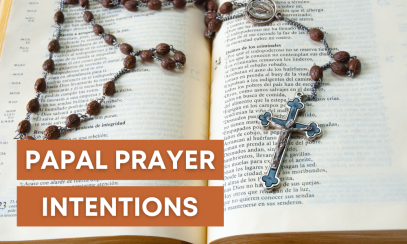
The Joy of Love and Marriage
Amoris Laetitia (The Joy of Love) is an apostolic exhortation by Pope Francis published in 2016. It explores the depth of love, everything from its source – Jesus Christ – to love between couples that blossoms into marriage that may bear fruit in the form of children and family, and even the work that goes into maintaining this love.
Amoris Laetitia (The Joy of Love) is an apostolic exhortation by Pope Francis published in 2016. It explores the depth of love, everything from its source – Jesus Christ – to love between couples that blossoms into marriage that may bear fruit in the form of children and family, and even the work that goes into maintaining this love.
This is the first post in our series exploring the wisdom of Amoris Laetitia in honor of National Marriage Week.
“Christ the Lord ‘makes himself present to the Christian spouses in the sacrament of marriage’ and remains with them.” (Amoris Laetitia 67)
What love is and what it is not
Chapter four of Amoris Laetitia dives into the seed of love that blossoms into marriage, exploring St. Paul’s famous passage concerning love in depth and reminding us of what love is and is not:
- Love is patient
- Love is at the service of others
- Love is not jealous
- Love is not boastful
- Love is not rude
- Love is generous
- Love is not irritable or resentful
- Love forgives
- Love rejoices with others
- Love bears all things
- Love believes all things
- Love hopes all things
- Love endures all things
The initial spark of love can suddenly flare into an all-encompassing fire at the beginning, but Pope Francis reminds us that the sacrament of marriage “endures long after emotions and passion subside.” (120)
A lifelong commitment
The Church emphasizes the seriousness of the lifelong commitment couples undertake when they choose to marry because Christ reconciled marriage to its original form and raised it to a sacrament. (71)
“Marriage is a precious sign, for “when a man and a woman celebrate the sacrament of marriage, God is, as it were, ‘mirrored’ in them; he impresses in them his own features and the indelible character of his love. Marriage is the icon of God’s love for us.” (120)
Married couples have a unique opportunity to realize the fullness of Christ’s love for the Church, especially since, through the sacrament of marriage, “‘they can make visible the love with which Christ loves his Church and continues to give his life for her’.” (121)
Yet people tend to forget that a major part of marriage is belonging to another, of accepting the challenges and aspirations of supporting their spouse, of growing old together and reflecting God’s own unending faithfulness to his creation. (319) Part of the godliness of marriage is spouses sacrificing themselves for one another, just as Christ set aside his life for the Church.
“Christian marriage is a sign of how much Christ loved his Church in the covenant sealed on the cross, yet it also makes that love present in the communion of the spouses. By becoming one flesh, they embody the espousal of our human nature by the Son of God. That is why ‘in the joys of their love and family life, he gives them here on earth a foretaste of the wedding feast of the Lamb.’ Even though the analogy between the human couple of husband and wife, and that of Christ and his Church, is ‘imperfect,’ it inspires us to beg the Lord to bestow on every married couple an outpouring of his divine love.” (73)
Setting aside selfishness
Love requires us to set aside our own selfish desires and notes that this counters the pervasive individualism of our current time, where our freedom of choice “lacks noble goals or personal discipline, [and] it degenerates into an inability to give oneself generously to others.” (33) But entering into marriage means committing to setting aside selfishness and extreme individualism for the sake of one’s spouse and family – it is a vow to choose one’s spouse over and over, every day, even during illness and times of turmoil.
“When love is expressed before others in the marriage contract, with all its public commitments, it clearly indicates and protects the ‘yes’ which those persons speak freely and unreservedly to each other. This ‘yes’ tells them that they can always trust one another, and that they will never ‘be abandoned when difficulties arise or new attractions or selfish interests present themselves’.” (132)
And just when things seem impossible during the tough times, spouses should remember that their vocation “flows from the incarnation and the paschal mystery,” so “neither of the spouses will be alone in facing whatever challenges may come their way. Both are called to respond to God’s gift with commitment, creativity, perseverance and daily effort.” (74)
Marriage is the foundation of the family, the fruits of the sacrament. God made couples to ‘“share in the work of his creation and, at the same time, made them instruments of his love, entrusting to them the responsibility for the future of mankind, through the transmission of human life’.” (81) In our next post celebrating National Marriage Week, we will explore the wisdom Amoris Laetitia contains concerning family.
Candace Bryant-Lester is the assistant editor at FAITH Catholic.



